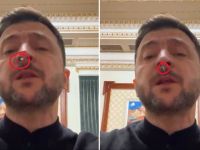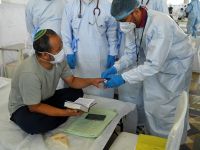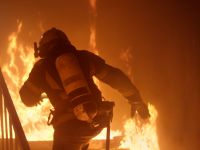United States Defense Secretary Donald Rumsfeld charged Monday that Iraq is actively developing biological arms and rejected as a lie Baghdad's claim that it has no secret weapons programs.
Rumsfeld made that accusation in Kuwait before setting out to visit the headquarters of the US Fifth Fleet in Bahrain, the second stop of a tour of US military installations in the Gulf that also will take him to Qatar.
Iraq issued a statement Sunday that it was ready to prove that it had no secret program to develop nuclear weapons or possessed chemical or biological weapons.
"They're lying," Rumsfeld said. "They have them and they continue to develop them," he told reporters at an airport press conference in Kuwait City.
Rumsfeld said it was known that Baghdad had weaponized chemical agents and had long had an active nuclear weapons program, AFP reported.
"It's also clear they're actively developing biological weapons."
The urgent threat posed by weapons of mass destruction has been the dominant theme running through Rumsfeld's appearances in Manama and earlier in Brussels where he met with NATO defense ministers.
In what European participants said was a sobering briefing to the alliance ministers last week, Rumsfeld highlighted the danger of difficult to detect but devastating germ weapons.
Though familiar with chemical and nuclear weapons threats, the alliance has paid less attention to the consequences of biological weapons, officials said.
Rumsfeld also has advanced the argument that the threat warrants preemptive action against "rogue states" that are alleged to be developing weapons of mass destruction and have ties to terrorist groups.
Although clearly alluding to Iraq, Rumsfeld has refused to comment on any prospective military action by the United States against Iraq.
Meanwhile, Rumsfeld said he hoped that before he leaves office the regime of Iraqi President Saddam Hussein would be changed.
"The United States government for a number of years now has believed that the solution for Iraq would be regime change," he said.
"What might take place prospectively is not something for me to be talking about," he said. "But clearly if you want the policy of our country it is that the regime of Saddam Hussein is a destabilizing factor in the region."
"I would think most of the people in the region and the world recognize the world would be a better place without that regime," he said.
"That regime threatens its neighbors repeatedly, it's listed on the terrorist list for the world ... They're not a model of good behavior."
In Bahrain, Rumsfeld was to meet with King Hamad bin Issa al-Khalifa as well as with the crown prince, the prime minister and the defense minister.
He was to visit sailors aboard two US warships in the capital of Manama and address some of the 4,225 US military personnel stationed there.
Rumsfeld is scheduled to travel Tuesday to Qatar, the last of three Gulf states he is visiting to thank for the crucial support for the US military presence in the region.
(Albawaba.com)
© 2002 Al Bawaba (www.albawaba.com)







